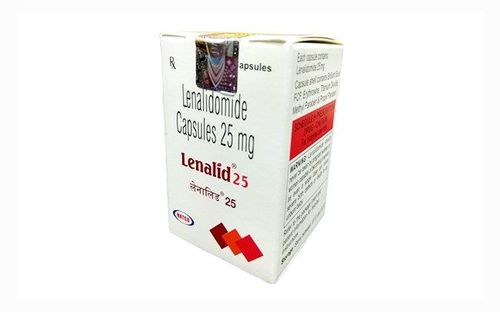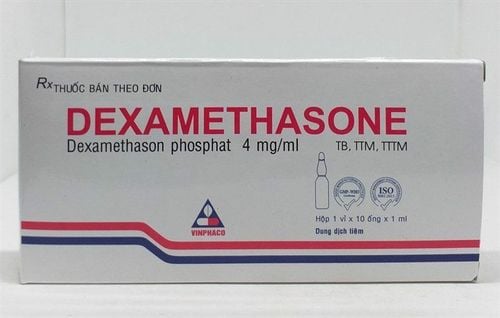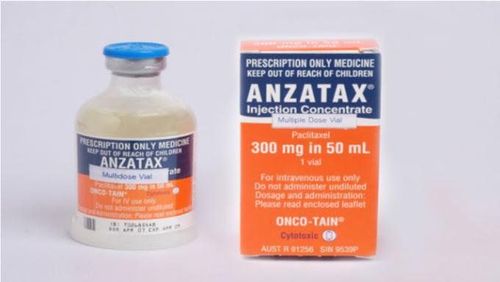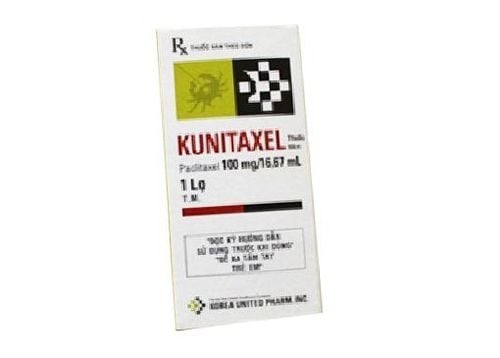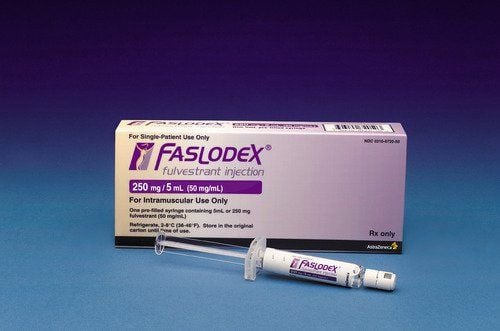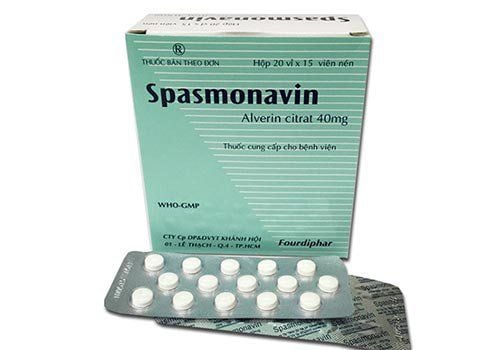This is an automatically translated article.
Paxus PM is an antineoplastic agent with a mandatory prescription by a specialist, commonly prescribed in metastatic breast cancers. So what does Paxus pm do, let's find out through the article below.1. What is Paxus PM?
Paxus PM has the main ingredient Paclitaxel - an anti-cancer drug of the Taxan group. This is a new agent that inhibits the breakdown of the microscopic network of the chromatin spindle, inhibits the normal remodeling of the microtubule network, thereby inhibiting the duplication of cancer cells during the mitotic phase. cell. Paxus PM is absorbed from the circulation, bound to plasma proteins from 89% to 98%, reaching effectiveness after 3 to 24 hours of dosing. The drug is metabolised in the liver via cytochrome P450 and is ultimately eliminated in the feces and urine.2. Indications of the drug Paxus PM
Paxus PM is indicated in the following pathologiesMetastatic ovarian cancer where treatment with anthracyclines and platinum has failed or is contraindicated. Patients with metastatic breast cancer used in combination with doxorubicin. Patients with metastatic or recurrent breast cancer but treatment with anthracycline drugs is not effective. Patient with non-small cell lung cancer, AIDS-associated Kaposi's cancer.
3. Contraindications of Paxus PM
Paxus PM should not be used in the following cases
Allergy to Paclitaxel or any other ingredient of the drug. The patient has a neutrophil count less than 1500/mm3 (1.5 x 109/liter). Motor neuron disease. Pregnant women and nursing children under 18 years old are not indicated to use Paxus PM.
4. Notes when using Paxus PM
Patients with impaired liver function transaminase increased 10 times or bilirubin increased more than 7.5mg/100ml (or 5 times) above the normal limit, need to monitor and adjust the dose of Paxus PM during treatment. Patients with concomitant cardiovascular diseases should consider the benefits of using Paxus PM. In patients with chemotherapy- or diabetes-induced peripheral neuropathy, the use of drugs that can worsen symptoms of the disease. Elderly patients taking the drug are at risk of toxicity on the nervous system and vascular system.
6. Paxus PM . Drug Interactions
When used with platinum derivatives (Cisplatin), Paxus PM should be used to avoid the risk of bone marrow depression. Taking Paxus PM with Doxorubicin will increase blood levels of doxorubicin, increasing the anti-cancer effect but increasing cardiovascular side effects. The drugs verapamil, diazepam, ketoconazole, quinidine, dexamethasone, cyclosporin, protease inhibitors,... increase the metabolism and elimination of Paxus PM. Drugs that induce cytochrome P450, isoenzymes CYP2C8, CYP2C9, CYP3A4 such as the anticonvulsants phenobarbital, phenytoin reduce the concentration of Paxus PM in the blood.
7. Dosage and usage
How to use:Paxus PM is prepared as a solution for injection. Use by injection or intravenous infusion. Dosage of Paxus PM depends on the condition of the disease, the nature of the tumor, the volume of the tumor and the doctor's instructions. Dosage Before treatment with Paxus PM 6 - 12 hours: Need to use dexamethasone 20mg (oral or intravenous); 30 - 60 minutes before treatment: Intravenous injection of cimetidine 300mg or ranitidine 50mg and diphenhydramine 50mg. Therapeutic dose: 135 - 175mg/m2, slow intravenous infusion over 3 hours or 24 hours. A course of treatment lasts 3 weeks, can be treated 3-4 times, each session is 3 weeks apart depending on the doctor's instructions.
8. Side effects of the drug Paxus PM
When taking Paxus PM, you may experience some of the following undesirable effects.Common side effects:
Allergic reactions, rash, peripheral edema, irritation at the injection site. Anorexia, fatigue, digestive disorders, nausea, vomiting, diarrhea, constipation, intestinal obstruction. Peripheral neuropathy. Myelosuppression, neutropenia, thrombocytopenia, severe anemia. Low blood pressure, bradycardia. Mucositis. Hair loss. Increased liver enzymes, increased serum transaminase 5 times the normal value, increased plasma bilirubin. Musculoskeletal pain. Infectious disease. Uncommon side effects:
Anaphylaxis, urticaria. Atrioventricular block. Coronary artery disease. In summary, Paxus PM is an oncology drug, highly effective in metastatic breast cancers that do not respond to conventional treatments. The drug causes many unwanted effects on the body, so when taking it, it is necessary to have a doctor's close supervision.




